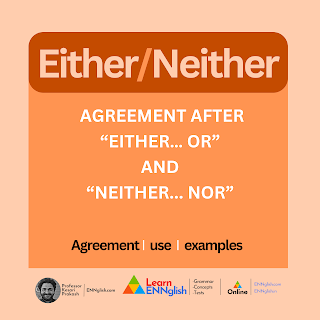Mastering Agreement After “Either… Or” and “Neither… Nor”
The constructions “either… or” and “neither… nor” can make subject-verb agreement challenging, especially when the subjects joined are of different grammatical numbers (singular or plural). In English grammar, the rule generally dictates that the verb should agree with the noun or pronoun closest to it, a principle known as the *proximity rule*. Let’s explore this topic in detail with examples, exceptions, and practical guidelines.
Understanding “Either… Or” and “Neither… Nor”
Both these conjunction pairs are used to connect two subjects in a sentence:
- “Either… or” indicates a choice between two options or subjects.
- “Neither… nor” negates both options or subjects.
Despite their similar structures, the verb agreement follows specific rules based on the subjects joined.
Rule 1: Verb Agrees with the Closest Subject
Example 1: Either the cat or the dog is responsible for the mess.
(The second subject, “dog,” is singular, so the verb “is” is singular.)
Example 2: Neither the students nor the teacher has arrived.
(The second subject, “teacher,” is singular, so the verb “has” is singular.)
Rule 2: Mixed Numbers
Example 1: Either the parents or the child is attending the meeting.
(The second subject, “child,” is singular, so the verb “is” is singular.)
Example 2: Neither the manager nor the employees are available for the call.
(The second subject, “employees,” is plural, so the verb “are” is plural.)
Rule 3: Exceptions and Ambiguities
In cases where the subjects are mixed in number, or formal usage is unclear, the verb agreement can vary based on emphasis:
Example 1: Neither the classrooms nor the office has internet access. (Formal usage)
Example 2: Neither the classrooms nor the office have internet access. (Informal usage)
Common Errors
- Incorrect: Neither the teacher nor the students was happy.
Correct: Neither the teacher nor the students were happy. - Incorrect: Either the manager or the team are responsible.
Correct: Either the manager or the team is responsible.

